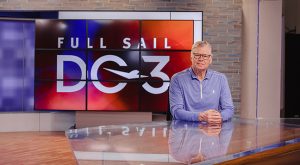Asking the Right Questions
 Iconic sports broadcaster Dan Patrick brings The Art of Interviewing to Full Sail University with new short-form course.
Iconic sports broadcaster Dan Patrick brings The Art of Interviewing to Full Sail University with new short-form course.
Whether on TV, radio or in print, few have interviewed as many distinguished individuals as Dan Patrick. Now, the legendary sportscaster is taking his decades of experience and sharing his in-depth knowledge on the finer points of being a great interviewer as part of a new partnership with Full Sail University, where he helped establish the Dan Patrick School of Sportscasting in 2017.
The Art of Interviewing is a new six-week online course led by Patrick in which students will learn the tools of the trade to help them with research and preparation, develop high-quality interview questions, apply effective questioning techniques and execute meaningful interviews.
“This is for everybody. You can be 20, you can be 40, you can be 60, you can be 80. The Art of Interviewing is for everybody, and everybody can learn from it. It’s just the ability to be curious and ask the right question at the right time,” he says.
We spoke to Patrick about the idea behind the course, the interviewers who have had an influence on him and find out the one person he’d like to reconnect with for another one-on-one conversation.
How did this new partnership with Full Sail University come about and what attracted you to the idea?
I love teaching interviewing. I am fascinated by it; and it goes back to my days at ESPN when I took a seminar for five days, eight hours a day on just interviewing. It changed my approach and changed my career, because now I have the ability to get the right answer out of somebody, or how you get the right answer.
This course isn’t just for students, the new partnership is really for anybody. It could be somebody who’s a salesman, someone who is in management, anywhere where you have to communicate with people. … And the approach to that is a step-by-step of teaching you how to interview. People think all you do is ask questions. Well, you do ask questions, but there is a strategy behind it. How are you phrasing your questions? Are they open-ended questions?
Your goal is not to be the smartest person in the room. Your goal is to make your subject reveal things—to tell you something. That could be asking questions to your kids as I have done around the dinner table. It could be somebody who sells cars and wants to get people talking to them. All walks of life, this could be helpful to you—and all ages as well. I don’t want people to think this is just for students, it is for everybody. And that’s how the partnership sort of developed into The Art of Interviewing.
The world of journalism is so vastly different these days. From your experience do you think the art of interviewing has been lost a bit?
I think what happens in interviewing is the person who is asking the question wants to sound like they know what the answer is going to be. Even if you know the answer, the goal is to ask the question, so the interviewee gives the answer to the audience.
You’ll find a lot of hosts, people doing interviews, who will ask, answer and ask. And that’s one of the biggest no-no’s that we have in the business. Don’t ask a question, answer the question and then ask the question. That’s basically out of insecurity. “Hey, I want to let you know that I know what I’m asking you.”
The audience wants to hear the answer and you need to get out of the way. There is nothing wrong with asking who, why, where, how, when—those are great questions to ask, but people will feel like the audience is going to say, “Oh wow, you don’t even know what you’re talking about.” No, that is why I am asking these questions so the interviewee can tell you—the audience—the story, not me. I might know the answer, but my audience doesn’t, and I think that’s what happens now.
And I don’t do “gotcha journalism.” I try to be respectful. You ask questions. You do your research. Do your homework. You can’t go in and just let it fly. But if you really want to get an interview that is standing out, then you have to go step-by-step and do your homework. Know how to ask the question and when to ask the question.
People will often say, “You ask great questions.” And I will say, “Well, yeah but did I get great answers?” That’s the key because then I asked great questions.








